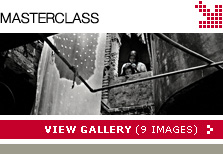|

In each issue of Enter, we put a set of near-identical questions to people who have taken part in a World Press Photo Joop Swart Masterclass.
These five-day events, introduced in 1994 to encourage and train young photographers, are normally held every November so that a dozen young practitioners from all over the world can meet and learn from some of the world's top professionals and each other.
In this edition, we have two Masterclass subjects.
The first is Bangladeshi Munem Wasif, a freelance currently represented by the VU Agency in Paris.
Twenty five-year-old Munem, who took part in the 2007 Masterclass and is based in his home city of Dhaka, has won many awards including first prize in the Konkurs Fotografii Prasowej in Poland and an honorable mention in the 2007 All Roads Photography Program by the National Geographic Society.
He was also named as one of thirty emerging photographers in the American Photo District News in 2008.
Munem, how did you get started in photography and what was your biggest break?
I was very bad at school. I was always interested in sports and outdoor activities. After school, my uncle suggested I take a course in photography at Begart Institute of Photography. Imtiaz Alam Beg (my teacher) inspired me a lot at that time. Then the first photography festival ‘Chobi Mela’ happened. I got to see a World Press Photo retrospective in our national museum in Dhaka. I was very much moved by the ambiance of the event. Later, I entered the Photography School ‘Pathshala’. I met people like Shahidul Alam, Barbara Stauss, Trent Parke, Raghu Rai, Abir Abdullah and Amitav Malakar. They changed my life forever.
I have just returned from Perpignan where I received the City of Perpignan Young
Reporter’s Award. I had an exhibition there. It got a huge response. I think this
is the biggest break in my life.
What qualities does a top photojournalist need?
To love people and be good human being.
What is your most memorable assignment?
I don’t do many assignments. I work only in Black and White. I usually work on personal stories. It takes a long time. I don’t like to hunt for news. Covering the protest against the UK-based mining company Asia Energy, now Global Coal Management, in Phulbari was very important for me. I was there for three days on behalf of Drik News. I saw ordinary people protesting against a giant corporate for their lives and land. I was moved by the spirit of those people.
Are you – or will you ever be – fully digital?
I am 100% digital now and I love it. Digital is not yet perfect but it will improve.
What essential equipment do you travel with?
Only a Canon 5d and a 28- 1.8 prime lens. Which doesn’t mean a thing. I am not very much interested in technical aspects.
What is your favorite camera and how do you use it most – do you prefer natural light, for instance, or artificial/mix?
For me the 5d is good but I am still not very happy with the level of highlight tolerance and low light. I hate the digital pixel; I love the grain of film. I always photograph in natural light, it’s beautiful and magical.
How, when under pressure, do you try and make sure the image is as good as possible?
I believe in instinctive photography. In a complex situation, your subconscious will tell you what to do. But you will learn from experience.
If there is one piece of advice you would give to a photojournalist starting out on a career, what would it be?
"Magnum photographers were meant to go out on a crusade...I went round the corner to the local supermarket because this is to me is the front line." (Martin Parr). Please ask yourself before going to a troubled zone what you want to do? And please try to remember publishing in big magazines is not the only photography. There are still so many stories need to be told in many ways, in your own countries, maybe in your houses too.
Which of the pictures you selected is your personal favorite and why?
I am more interested in a whole body of work rather than a single photograph. I really like this body of work because I feel it’s really personal, intimate and I am still discovering it three years later. I can smell it.
Next to whom would you like to sit in an airplane going where?
Ha ha. I don’t like to travel by plane. I would love to travel my country’s rivers by a boat with my girlfriend Reeta and some other friends.
What ambitions do you have left?
I want to photograph my own country, my people, the joy, the love, the anger, the mystery, the sadness. I can feel them when I look at my people’s faces. Salute comrades.
|
|


Munem Wasif


|
|